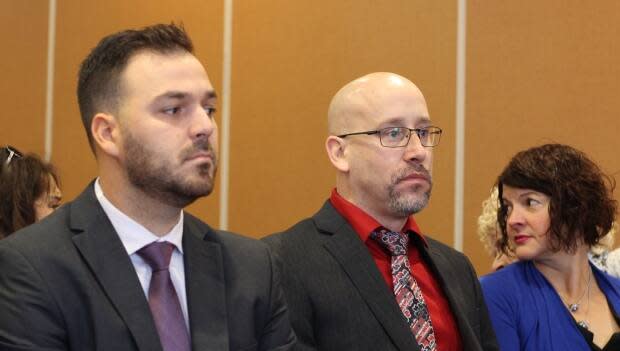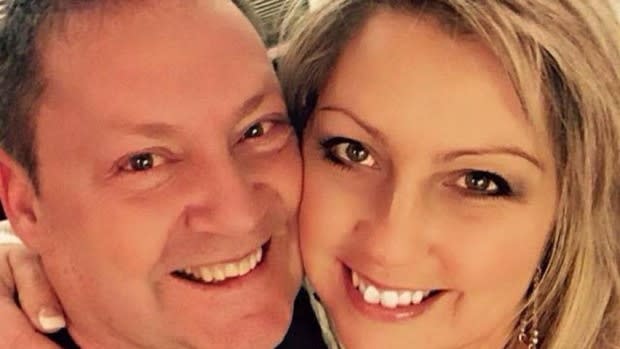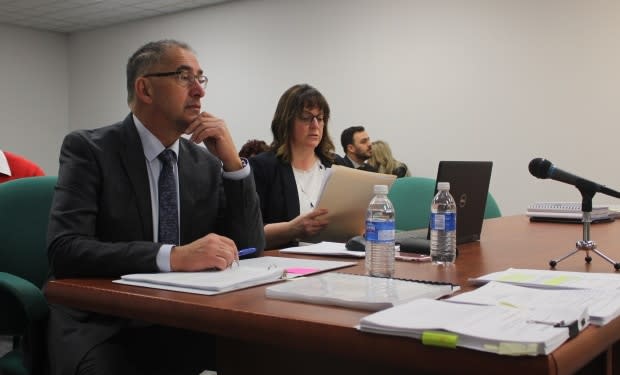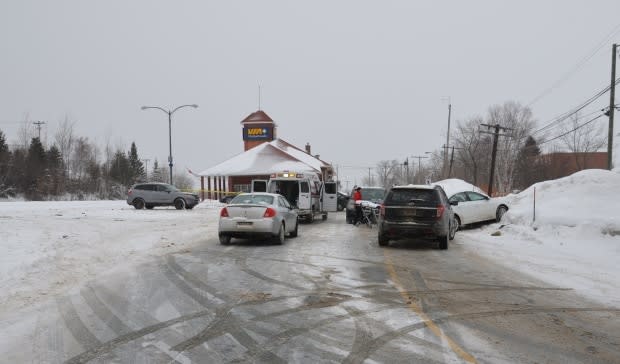Officers tried to 'show their mettle' in rush to fatal encounter, lawyer argues
An arbitrator now must decide whether two officers involved in the fatal shooting of Michel Vienneau in Bathurst almost five years ago violated their code of conduct and should be fired.
Arbitrator Joël Michaud has 15 days to issue a decision. Lawyers representing the Bathurst police chief and the two officers offered closing arguments Monday in Fredericton after testimony was heard from 13 witnesses over 10 days.
The officers deny wrongdoing in the death of the 51-year-old Tracadie businessman on Jan. 12, 2015. Police were waiting for Vienneau at the Bathurst Via Rail station based on anonymous Crime Stoppers tips he was trafficking drugs on the train. The tips turned out to be false and there's no evidence he had any criminal history or links.
The police chief alleges constables Mathieu Boudreau and Patrick Bulger each violated five parts of the their code of conduct and is seeking their dismissal.
Their lawyers suggested Vienneau was to blame for his death because he didn't stop for police and purposely hit Bulger, prompting Boudreau to fatally shoot Vienneau.
Officers had 'tunnel vision'
Basile Chiasson, the lawyer for the chief, argued the two officers had "tunnel vision" after hearing about the Crime Stoppers tips from a supervisor and rushed to the train station hoping to make an arrest and "show their mettle."
"There was no need to act as rashly as they did," Chiasson said in his closing remarks.
T.J. Burke and Brian Munro, representing the two officers, said they've been blamed for an operation that went to plan until Vienneau hit Bulger.

"It's easy after the fact to try to assign blame and isolate that blame to two people," Munro said.
The anonymous Crime Stoppers tips, one adding more details, alleged Vienneau was trafficking pills on the train back from Montreal.
The tips named Vienneau and his fiancée Annick Basque, who was with him on the trip. The tips gave details about their vehicle and travel plans.
The tips were forwarded by Crime Stoppers to the members of the Northeast Integrated Intelligence Unit, which carried out intelligence gathering and surveillance work on organized crime and drug traffickers.
Bulger and Boudreau were the newest members of the seven-member. Their supervisor, Sgt. Ron DeSilva, told the members of the unit they had "missed a load of drugs." Bulger called the train station and found out the train had yet to arrive. Officers then began preparing to go the station.
The officers, working for an undercover unit, were in plainclothes and in an unmarked police car.

It's unclear if Vienneau knew Bulger and Boudreau were officers. Basque testified at the hearing that she didn't know they were police officers when she saw Bulger with a gun in his hand. She thought they were being attacked by "druggies" or terrorists.
The only thing they wore indicating they were officers was a badge hanging on a chain around their necks. Boudreau activated a small flashing red and blue light on the car's visor and another system to make its headlights strobe.
Witnesses said the events in the train station parking lot unfolded over just seconds. The officers testified that Vienneau kept driving his white Chevrolet Cruze and hit the unmarked police car before hitting Bulger.
Bulger went to a hospital after the shooting to have his knee examined. He described the records as indicating he had a "bone detachment" and was given a brace to wear for several weeks.

Burke said if there were issues with the visibility of flashing police lights in the unmarked car or their clothing, that is the fault of the police force that provided the equipment and not the officers.
Burke said what went wrong that day was that Vienneau tried to drive away from officers and hit Bulger.
"This was Matt Boudreau's first big operation," Burke said. In the end, Boudreau ended up playing the most critical role "of saving another officer's life" who was being run over by a car.
He suggested, without proof, that just because no evidence was found of Vienneau being linked to crime doesn't mean they weren't somehow involved in crime.
He argued information in the tips was verified by what officers saw before they attempted to stop Vienneau, including that he was on the train with Basque and that his car was parked at the train station.

Munro said the officers weren't just acting on a hunch. They were acting on tips that initial checks indicated were correct. A team of officers and supervisors was informed, he said.
Chiasson argued that the officers "essentially manufactured all by themselves" a set of circumstances that led to Vienneau's death. He said they could have acted with restraint and kept the pair under surveillance, instead of using "hasty" actions.
"We ask that you come to the conclusion that Const. Patrick Bulger is unfit to serve as a police officer with the Bathurst Police Department, and that Const. Mathieu Boudreau is unfit and undeserving of the public trust to serve as a police officer with the Bathurst Police Department," Chiasson said, wrapping up his remarks.
Thirteen witnesses testified during the hearing, which spanned 10 days in Bathurst. Closing arguments took place in Fredericton to accommodate the lawyers' schedules.
The officers are suspended with pay.
Michaud, a lawyer appointed as arbitrator, has 15 days to issue a decision.


